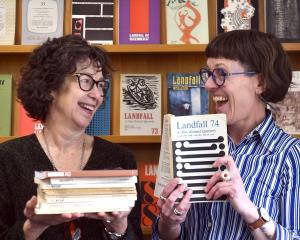
His latest work is not just another war play, director Keith Scott says.
In fact, he has done all he could to ensure it was not, to the point of taking it beyond reality.
"There is something else going on: they call it the shadows. This sense of predetermination that there are forces operating on the three characters that determine a path they have no control over," Scott says.
"It’s a series of experiences moving from the idyllic to the horrific and out the other side."
The play, 1917 — Until the Day Dawns, was written by Scott as a result of research he was doing for a history of Central Otago soldiers in World War 1.
As part of his research for the book, he looked at 500 soldiers’ field service files, which covered their tour of duty from enlisting to being demobilised or killed.
From that, he got the idea of writing a play about the collective story of boys from the same place, going to war and their experiences.

He decided to focus on 1917 as that was the time when people began to feel the true impact of the war.
"The truth was out, it couldn’t be hidden anymore. I believe what it created was a crisis of grief."
Also at that time people had stopped volunteering to go to war so the Government, at the urging of Great Britain, brought in compulsory military service.
The first recruits from that were notified at the end of 1916 and headed overseas in January 1917.
Scott decided to base his story around three young Maniototo friends — Billy Wilson (played by Ashley Stewart), Sam Mulholland (Laith Bayan) and Jack Mathews (Daniel Cromar) — who head off to war after one of them is conscripted.
They had not volunteered for different reasons but when one of them, Jack, finds out he is going, the other two rethink their positions.
"Sam [a pacifist] decides the ties of friendship are greater than his principals, while Billy simply doesn’t want to be left behind."
The play then follows them through their service in Europe to the Battle of Passchendaele — considered a "jolly posh" name by one of them.
"That’s how they genuinely felt, they didn’t know they were caught up in world-changing events."
Scott believes the work questions a lot of things people take for granted about New Zealand’s involvement in the war.
"The play in various ways picks up an alternative way of looking at the situation, particularly from the way the media were presenting it."
There is an Anzac Day scene that questions why the troops were doing what they were.
"It questions that ‘Lest We Forget’ cliche.’’Interwoven throughout the play is the trio’s relationship and the secrets they all hold.
"Only one is left at the end. Jack. He has to deal with the guilt of the death of his friends. If he had not gone ... Eventually that works out for him, but it takes a long time to work through the guilt."
The issue of the soldiers’ mental health is a theme throughout the play.
"Billy is in a fragile state of mind; there must have been a lot of soldiers just like him fighting."
The military was concerned about their physical health but mental health was never mentioned.
"So many came back with shell shock, which the army at first refused to recognise. There must have been so many men mentally not fit to go to war."
Scott wanted to avoid the "King and Country" presentation of some war plays so decided to take the play beyond the linear story of the three boys’ experiences.
"It’s an attempt to widen the story into more of an interesting and intricate theatre presentation. I don’t want it to be real, but have the surreal and real coincide, clash and exist together."
So he introduces another universe.
"It’s something only Billy is vaguely aware of."
It means the audience will not be quite sure if they are watching something happen or something going on in someone’s head.
The sense of predetermination is something those at home felt as well as those at war.
"It comes out in the Anzac Day scene when all characters are on stage, whether they are in New Zealand or at the Western Front: there is the boys discussing their dawn service and the women discussing theirs as well."
He believes it adds "interesting theatrical depth" and allows him to create an image on stage of all the characters’ experiences at that time.
To add another dimension Scott has brought in musician Bill Morris to sing and play guitar.
"There are moments in the play of high drama where everything just stops and Bill sings; modern songs, not period ones."
In the Anzac scene he sings the late Marcus Turner’s When the Boys are on Parade.
"I’m trying to create this more expansive, multifaceted theatre experience."
Adding to that experience is a set with a difference. Instead of creating a realistic battleground, Scott has chosen to go with an "abstract and sculptural" set.
"It’s like giant children’s building blocks, which can be moved around into different formations: it’s very effective. It reinforces the unreal aspects."












